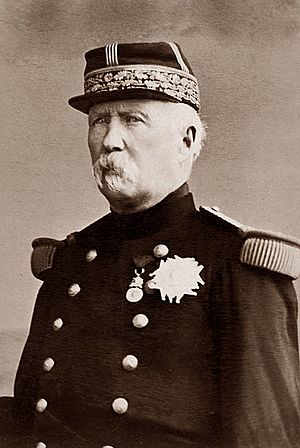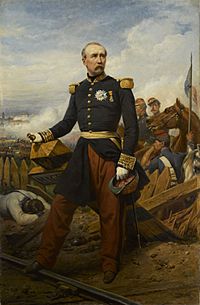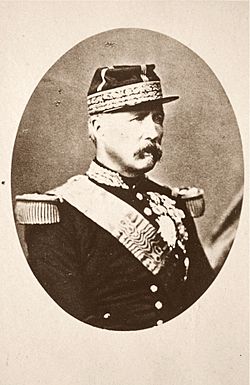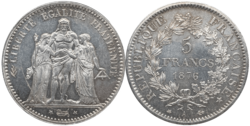Patrice de MacMahon facts for kids
Quick facts for kids
Patrice de MacMahon
|
|
|---|---|

Patrice de MacMahon, c. 1890
|
|
| President of France | |
| In office 24 May 1873 – 30 January 1879 |
|
| Prime Minister | Albert de Broglie Ernest Courtot de Cissey Louis Buffet Jules Armand Dufaure Jules Simon Gaëtan de Rochebouët |
| Preceded by | Adolphe Thiers |
| Succeeded by | Jules Grévy |
| Governor-General of Algeria | |
| In office 1 September 1864 – 27 July 1870 |
|
| Monarch | Napoleon III |
| Preceded by | Édmond de Martimprey |
| Succeeded by | Louis Durrieu |
| Member of the Senate | |
| In office 24 June 1864 – 4 September 1870 |
|
| Nominated by | Napoleon III |
| Personal details | |
| Born | 13 June 1808 Sully, Saône-et-Loire, France |
| Died | 17 October 1893 (aged 85) Montcresson, Loiret, France |
| Political party | Miscellaneous right (Legitimist) |
| Spouses |
Élisabeth de La Croix de Castries
(m. 1854–1893) |
| Children | Marie Armand Patrice de Mac Mahon (1855–1927) Eugene de Mac Mahon (1857–1907) Emmanuel de Mac Mahon (1859–1930) Marie de Mac Mahon (1863–1954) Countess de Pinnes |
| Relatives | MacMahon family |
| Education | Special Military School of Saint-Cyr |
| Profession | Military officer |
| Military service | |
| Allegiance | |
| Branch/service | French Army |
| Years of service | 1827–1873 |
| Rank | Captain Commandant Lieutenant colonel General Marshal of France |
| Unit | Lt. colonel 2nd Foreign Legion Regiment 2ème R.E.L.E/2e RE (1843–1845) Commander I Army Corps Army of the Rhin (1870) Commander-in-Chief Army of Châlons (1870) |
| Battles/wars | Conquest of Algeria (1827–1857)
Crimean War (1853–1856)
Franco-Austrian War (1859)
Franco-Prussian War (1870–1871)
|
Patrice de MacMahon (born June 13, 1808 – died October 17, 1893) was an important French general and politician. He was known as a Marshal of France, which is a very high military rank. He served as the Chief of State of France from 1873 to 1875. Then, he became the President of France from 1875 to 1879.
MacMahon led the main French army during the war against Germany in 1870. He was injured and trapped at the Battle of Sedan in September 1870. This happened partly because his battle plans were unclear. The French army, including MacMahon and Emperor Napoleon III, surrendered to the Germans. France lost the war, and the Emperor had to leave the country.
After he recovered, MacMahon became the head of the Versailles Army. This army stopped the Paris Commune revolt in May 1871. This event helped him start his political career. MacMahon was a very traditional and religious person. He did not like socialism and didn't trust the Republicans, who were mostly not religious. He tried to protect the Constitution and refused ideas of a king taking over. He wanted a government where the assembly chose the leaders. However, he also insisted on having an upper house in parliament. He later dissolved the Chamber of Deputies, which made many people angry. This led to Republicans winning the next election. Soon after, MacMahon resigned and lived a private life.
Contents
Biography
Family Background
The MacMahon family came from Ireland. They were important lords in Ireland. After losing much of their land in 1652, some of them moved to France. They supported King James II and settled in France in the late 1600s. In 1749, they became French citizens. The King of France, Louis XV of France, recognized their noble status.
The MacMahon family was a military family, with 14 members serving in the army. Patrice de MacMahon was born on June 13, 1808, at the Chateau de Sully in Burgundy. He was the sixteenth of seventeen children. His family was already part of the French nobility and supported the royal family.
Early Military Career
In 1820, MacMahon began his education at a seminary in Autun. He then studied in Paris. On October 23, 1825, he joined the Special Military School at Saint-Cyr. After graduating in 1827, he joined the French Army.
In 1830, he joined the 4th Hussars Regiment. MacMahon then took part in the French conquest of Algeria. He was praised for his courage during the capture of Algiers. In November 1830, he showed great bravery during the Medea expedition. He received the Knight Order of the Legion of Honour.
MacMahon returned to France in 1832. He participated in the Ten Days' Campaign and the Siege of Antwerp. He became a captain in 1833. He went back to Algeria in 1836. He led daring cavalry attacks and was wounded during the Siege of Constantine in 1837. In 1840, he was promoted to cavalry squadron chief.
In May 1841, he returned to Algeria again. He led the 10th Chasseur Battalion à Pied. He fought bravely against the troops of Emir Abdelkader. In December 1842, he was promoted to lieutenant-colonel in the French Foreign Legion. He commanded this regiment until 1845.
MacMahon continued to show his bravery in battles like Chaab el-Gitta and Aïn Kebira in 1844. In December 1845, he became a colonel. By 1848, he was a général de brigade (brigadier general). In 1849, he became a Commander of the Legion of Honour. In 1852, he was promoted to Général de division (major general).
Crimean War and Sevastopol
During the Crimean War, MacMahon led the 1st Infantry Division. In September 1855, his troops won a victory at the Battle of Malakoff. This battle was part of the Siege of Sevastopol. During the fight, he famously said: "Here I am; here will I stay!" This showed his strong determination.
Senator and Further Algerian Service
After returning to France, MacMahon received many honors. He was appointed as a Senator. He wanted a more active role, so he went back to Algeria. There, he fought in a campaign against the Kabyle people. When he returned to France, he voted against a new law. This law would have made it easier for the government to act against political opponents.
Magenta: Marshal of France
MacMahon showed great skill during the Italian Campaign in 1859. He moved his troops forward without waiting for orders at a key moment during the Battle of Magenta. This action helped the French win the battle.
For his military achievements, Emperor Napoleon III made him a Marshal of France. He also gave him the title of Duke of Magenta.
Governor General of Algeria
In 1861, MacMahon represented France at the coronation of William I as King of Prussia. In 1864, he was named the Governor General of Algeria.
MacMahon started some reforms in this role. However, there were many complaints against him. In early 1870, he offered his resignation to Napoleon III. The Emperor accepted, and MacMahon was called back to France.
War and the Paris Commune
MacMahon led the main French army in the Franco-Prussian War. His army suffered several defeats in Alsace. He was seriously wounded during the Battle of Sedan. In 1871, the French army surrendered, and Germany won the war. MacMahon, along with the Emperor, was captured.
In 1871, he became the head of the army of the French Third Republic. He led the military campaign that defeated the Paris Commune revolt in May. This event made him a hero to many conservatives.
President of the Republic
In May 1873, MacMahon was chosen as President of the French Third Republic. He was elected by the royalist and conservative members of the National Assembly. He replaced Adolphe Thiers. MacMahon then appointed Duke Albert, 4th duc de Broglie as Prime Minister. They worked to establish a more conservative "moral order."
MacMahon wanted to bring back the monarchy (a king). But when this plan failed, he accepted a seven-year term as president. He believed he was responsible to the country, not just to parliament. This caused problems with the Chamber of Deputies.
In his writings, MacMahon said he was a "Legitimist," meaning he supported the royal family. However, in November 1873, he refused to meet with the person who wanted to be king. He felt this was not right for his duties as President. He declared he would respect the current legal system. He tried to stay "above parties" (neutral).
In 1875, the Garonne region suffered bad floods. While visiting the flooded areas, he said, "nothing but water…only water!"
After the 1876 elections, Republicans gained a majority. MacMahon reluctantly agreed to governments led by Republican prime ministers.
In 1877, a crisis happened between MacMahon and the Chamber of Deputies. MacMahon dismissed Prime Minister Jules Simon and appointed Albert de Broglie again. Hoping for a conservative win, MacMahon convinced the Senate to dissolve the Chamber of Deputies. He campaigned, saying he would not overthrow the Republic. However, Léon Gambetta, a Republican leader, famously said, "The President has only but one choice: he must submit or resign."
The elections in October 1877 gave Republicans a clear majority. Prime Minister Broglie resigned. MacMahon tried to form another government, but the Chamber refused to work with him. He then recalled a Republican, Dufaure, to form a new government. In January 1879, Republicans also won the Senate elections. MacMahon lost all his parliamentary support. He resigned on January 30, 1879.
His time as president allowed the Republic to become stronger. However, he tried to limit the power of parties that were against the Catholic Church. He believed that radical ideas would harm the nation. His government was somewhat strict with the left-wing. Newspapers were watched, and officials suspected of supporting Republicans were removed. But he did not support a takeover by monarchists. MacMahon truly believed that the National Assembly should rule France, not the president.
Last Years
From 1887 to 1893, MacMahon led the Société de secours aux blessés militaires. This group later became the French Red Cross.
Patrice de MacMahon passed away on October 17, 1893, at the Château de la Forêt. He was buried on October 22 at the Hôtel des Invalides after a state funeral.
Honours
 French Empire:
French Empire:
- Knight of the Legion of Honour, 1830; Grand Cross, 1855; Grand Master, 1873
- Médaille militaire, 1857
 United Kingdom: Honorary Grand Cross of the Order of the Bath, 1856
United Kingdom: Honorary Grand Cross of the Order of the Bath, 1856 Kingdom of Sardinia: Knight of the Supreme Order of the Most Holy Annunciation, 1859
Kingdom of Sardinia: Knight of the Supreme Order of the Most Holy Annunciation, 1859 Kingdom of Prussia: Knight of the Order of the Black Eagle, 1861
Kingdom of Prussia: Knight of the Order of the Black Eagle, 1861 Denmark: Knight of the Order of the Elephant, 1869
Denmark: Knight of the Order of the Elephant, 1869 Spain: Knight of the Order of the Golden Fleece, 1875
Spain: Knight of the Order of the Golden Fleece, 1875
Battle Injuries
MacMahon was wounded four times during his military career:
- In 1837, during the Siege of Constantine, a bullet hit his uniform.
- In 1840, a bullet went through his sabre and hit his rib cage.
- In 1857, at the battle of Icheriden.
- Most seriously, on September 1, 1870, at Sedan.
Quotes
- When showing his trust in the Foreign Legion during the Battle of Magenta, he said: "The Legion is here. It's in the bag!" ("Voici la Légion ! L'affaire est dans le sac !" ).
- During the Siege of Sevastopol in the Crimean War, MacMahon led a French attack. He captured the Malakoff fort. People told him to retreat because Russian counter-attacks were coming. He refused, saying "J'y suis. J'y reste!" ("Here I am, Here I stay!"). MacMahon's troops held the fort, and Sevastopol soon fell. This quote became famous for showing strong determination.
Images for kids
-
Patrice de MacMahon, The Duke Magenta
See also
 In Spanish: Patrice de Mac Mahon para niños
In Spanish: Patrice de Mac Mahon para niños
- Origins of the French Foreign Legion
- Marie Louis Henry de Granet-Lacroix de Chabrières
- François Certain de Canrobert
- Jean-Luc Carbuccia
- François Achille Bazaine










